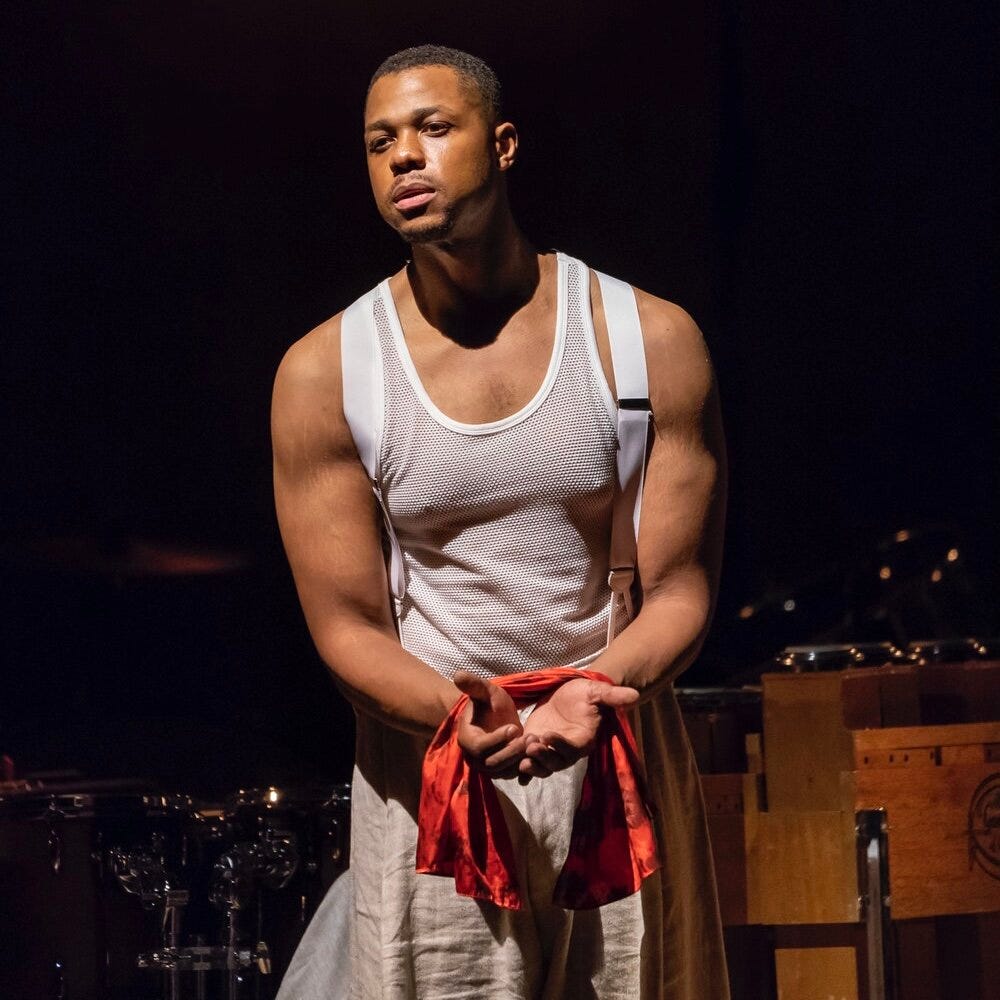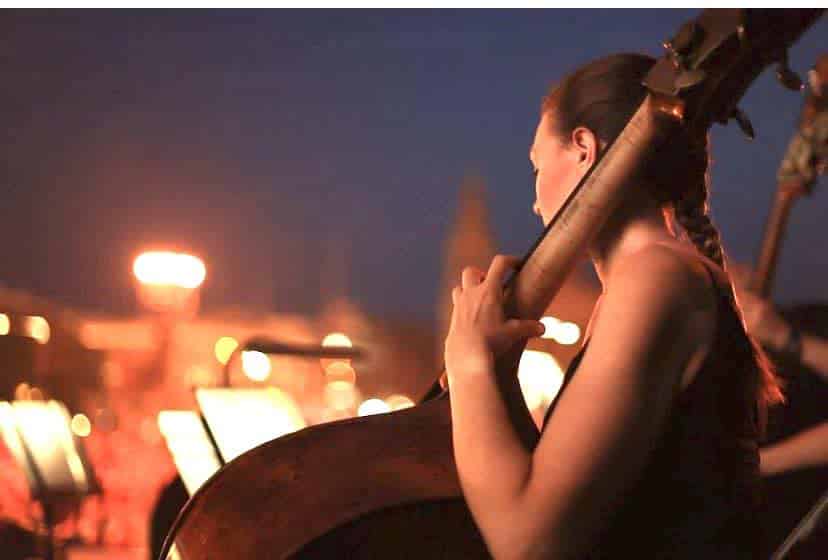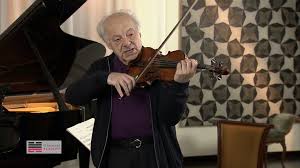Yannick adds sermon to Beethoven symphonies
NewsA forthcoming concert on the Philadelphia Orchestra website:
Yannick Nézet-Séguin Conductor
Davóne Tines Bass-baritone
Various Sermon
I. “Shake the Heavens,” from El Niño (A Nativity Oratorio), by John Adams
II. “Vigil,” by Igee Dieudonné and Davóne Tines
III. “You Want the Truth, but You Don’t Want to Know,” from X: The Life and Times of Malcolm X, by Anthony Davis
Beethoven Symphony No. 2 (November 5 and 7)
Beethoven Symphony No. 8 (November 5 and 7)
Simon Fate Now Conquers (November 6)
Beethoven Symphony No. 7 (November 6)
In Sermon, bass-baritone and activist Davóne Tines performs contemporary works by John Adams and Anthony Davis, as well as “Vigil,” co-written by Igée Dieudonné and Tines and dedicated to the memory of Breonna Taylor. This modern masterpiece opens our continued celebration of Beethoven’s symphonies along with Carlos Simon’s Fate Now Conquers.







Enough with the lecturing and bogus refulgences!!
Ok, say what you want, but in the old days it would’ve been some token modernist stuff on the first half and then Beethoven. Now it’s token woke stuff before Beethoven. Either way, people will love or hate the first half and then stick around for the Beethoven.
I just hope Yannick drops the “segue directly into Beethoven” gimmick. Talk about making ABSOLUTELY SURE people listen the preceding music.
I take Yannick’s “Sermons” over Muti’s actual rambling sermons, a standard encore every single time the CSO gives a concert now. And I take Yannick’s programming over Muti who invites Chicago’s African American Mayor to listen to Price’s symphonies, only to deride the composer in private.
Anonymous accusations — which could amount to nothing more than untrue slander — should not be allowed.
IF what you say is true, it is disturbing. But it seems to be gossip at this point and we should not rush to judgment on Muti.
It would seem odd that he would schedule Price if he didn’t want to because he has a lot of power. I am sure he is also sensitive to his historical portrayal. The derision you talk about could be very academic and aimed at her music rather than her race and person. Let’s wait to see what more trusted figures say about it.
Riccardo Muti disparages Mahler. You do the math.
“Muti’s actual rambling sermons, a standard encore every single time the CSO gives a concert now.” Ahh, I see. You really really really don’t like R. Muti. Still, you should confine your criticisms to the realm of fact. I was on stage for every CSO concert the Music Director conducted this fall, nine performances in all. He spoke after two of them. It’s possible the Muti derided Price. I personally have seen no evidence of this, nor do you offer any.
You want to limit the discussion to hard evidence. I see.
Here you can find evidence of Muti using derogatory terms to deride Maestro Myung-Whun Chung’s Asian ethnicity.
https://www.ansa.it/sito/notizie/cultura/musica/2021/05/12/scala-scintille-muti-chailly-dopo-il-concerto-di-ieri_1728d96c-068b-4cf6-a378-ae68032af67d.html
Do you mind to comment on that, on behalf of your Asian colleagues at the CSO? Would you like to ask Robert Chen (CSO Concermaster) to be a stand-up guy, a leader, and officially ask Muti to apologize? Or perhaps you want to ask Jeff Alexander to do the same?
In defending Muti’s character, one inevitably finds himself on the wrong side of the equation.
There were two specific claims in your first post.
1: Muti speaking was “a standard encore” at CSO concerts he conducts.
2: Muti disparaged the music of Florence Price.
I pointed out, quite correctly, that #1 is demonstrably false, #2 was offered up without a shred of evidence. I’m not surprised you want to change the subject.
Congratulations on finding a hearsay account of Muti calling Maestro Chung Chinese. Game, set, and match, I guess–in your world. Unfortunately, it has absolutely nothing to do with this conversation.
“It’s possible that Muti derided Price.”
The advantage of a disgraceful reputation. Right, Maestro? Nobody’s surprised if you deride Price. Not even your own orchestra.
“It is possible”. Lots of things are possible. In other words, you can’t disprove a negative. As I pointed out already, not a scintilla of evidence was offered that this actually occurred. So what is your point?
ANSA is a top news agency, and the most important in Italy. Not your ordinary tabloid.
Looks like CSO musicians are in denial.
They had no hard evidence, just hearsay in the article. So I’m not at all clear on how germane to the conversation it is that they are “top” or “important”.
A typical conservative, using only the facts which serve them rather than the truth.
You are so pathetic. Haters hate and you always find a way to completely change the subject at hand to an anti-Muti rant. So pathetic. I find Muti’s “sermons to be informative and I love that it upsets you. DON”T GO TO THE CONCERTS.
Good to see The Phillies taking the knee for the mob.
Yes, there’s pseudo-religion and evangelizing in all of this stuff.
A masterpiece? Well…..
Here it is:
https://www.youtube.com/watch?v=GGl20GIUm7A
It is unbearably underdeveloped. And it is obviously not about the music, which could have been the sound under a commercial for a new car, herb tea, an expensive spa or the mormon church.
Here is some other music by this Dieudonnée:
https://www.youtube.com/watch?v=lCYOxS0M-to
…. which is more interesting: music inspired by the twenties of the last century (Satie, Ravel). There was no restriction on race.
Music in the service of social justice and antiracism.
In the automn of 2020 Dutch National Opera cancelled an Otello production because, on second view, the cast happened to be ‘all-white’ and that was no longer acceptable ‘given contemporary social changes’.
‘A contemporary production of Otello can only be done by a black cast. There should be space for a black perspective.’
I’m not making this up:
https://www.theaterkrant.nl/tm-artikel/er-wordt-nog-steeds-veel-liefde-en-aandacht-gegeven-aan-werken-die-mensen-uitsluiten/
Then we want Carmen, The Wizard of Oz, Hamilton, and various Shakespeare plays done with all black casts back! Fair is fair.
“A contemporary production of Otello can only be done by a black cast ……”
Otello was a Moor. Strange, isn’t it, that Otello or Othello can be played by an actor from 6,000 km or more to the south, but not by an actor from 3,000km or less to the north?
Sounds a lot more listenable than the usual common opening works.
Many contemporary pieces reference issues of the day. But why are these special, and what’s the problem? It wouldn’t have something to do with race, would it ?
Do you know him well enough to call him
by his first name ?
What a strange question when the very youngest children these days are taught to call all adults by the first name – no matter how far up the pecking order they are.
The respect of an honorific is earned.
If Nézet-Séguin wishes to preface his Beethoven with these that is his choice as, presumably, are all the concerts that conductors are given the choice to design.
We are adding the term ‘woke’ to this far too easily and not a little lazily. No doubt Séquin can be construed as being in that camp but playing something ‘different’ to the standard repertory is to be welcomed rather than dismissed?
Those for whom this is a step too far can always stay away and who knows it might just attract an element of the audience who might never cross the threshold to hear ‘Beethoven’, or any other ‘dead white male composer’. And who equally knows their minds and ears might be a little more open than those of some of the commenters here!
I’m gonna puke. If I subscribed I would cancel.
If I was a subscriber, I’d be more put out with the season being so heavy on the same old symphonies by Beethoven, Brahms, Dvorak, Schubert, Tchaikovsky, Shostakovich, etc.
To their credit there are some interesting contemporary pieces in there, but how about some Walton, Martinu, Janacek, Grainger, Ives, Messiaen, and Zemlinksy, to name a few.
Pity about the Beethoven; I’d love to hear this.
And I notice that after the pre-show grousing about “woke opera,” nobody seemed to have anything to say about the YNS-led “Fire Shut Up in My Bones” at the MET, which turned out to be a great show, great enough to shut up the trolls on SD, perhaps.
I didn’t say anything about Fire because I only discuss opera here and one thing is clear: it ain’t an opera. Yes, “show” is the right word and it belongs on Broadway.
I can’t speak to “Sermon”, but it so happens that this past weekend, the San Diego Symphony performed Carlos Simon’s “Fate Now Conquers” before Beethoven’s 7th. The title is derived from Homer, as quoted by Beethoven, and the work ingeniously uses elements of the second movement of the 7th — without actually quoting the themes — to form musical fragments that are buffeted by blows of fate, in keeping with the sentiments of Homer and Beethoven (at the time he quoted the passage). The work is concise; indeed, I heard more than one person seated nearby saying they wished it had lasted longer. On the basis of this work, I certainly look forward to hearing more of Simon’s music.
Thanks for your comment on Carlos Simon’s work, it sounds like he is worth hearing and I will listen out for him.
Here it is (fragment):
https://www.youtube.com/watch?v=pCapNmEEFhs
I think it’s nice & nicely done. Fate is not too bad, after all.
I was glad to attend the extremely packed and wildly enthusiastic house for the Philadelphia Orchestra’s first return concert , but much as I appreciate Nezet-Seguin, it is true that the instant segue from the opening commissioned piece into the Eorica served neither the living composer nor Beethoven well.
This ‘instant relevance’ PR gimmick for commissioned pieces is not some new thing suddenly provoked by “cancelling” or “wokeness” – way back in 1986 the orchestra came up with a piece purportedly about the Challenger tragedy only a few months after the actual occurence. This just the continuation of the desperate fight against the irrelevance of contemporary composition. And THAT started as early as 1920 or so – just about when the academic serialists began making composition irrelevant to the human ear.
But what we have now is a desperate attempt to make new music ‘relevant’ through absurd means – all about wrapping paper and not content.
The superficiality of modern society cannot produce music with some content, even when composers leave behind academia and desperately try to tune-into the trendy hip of the Zeitgeist. And meanwhile the appearance of truly gifted composers is overlooked, goes unnoticed:
https://www.youtube.com/watch?v=VXMykAOkV1c
Maybe this is what it takes to get the younger, woke generations into the concert hall. I just want go to a concert and escape the real world for a couple of hours, wallow in glorious music written by geniuses, performed by orchestras at the top of their game. I don’t want to be lectured or made to feel guilty. Oh, for the days of Ormany, Muti, Sawallisch, Echenbach. Concerts like this will drive a lot of older, and deep pocketed, listeners away.
I’m just a simple country musicologist, but a lot of that music written by those geniuses was music for and about their time; they weren’t living in Lake Woebegon. Beethoven dedicated Eroica (at least originally) to Napoleon; Mahler knew Siegmund Freud and the artists of the Vienna Secession in the declining years of the Austro-Hungarian empire; Mozart’s Marriage of Figaro was based on the Beaumarchais play banned by the emperor; he wasn’t just writing pleasant little ditties – sounds like he was “woke.” Shostakovich, well, no explanation needed. But by all means, go the hall, relax to the charming and uncontroversial melodies of the great masters.
Maybe it’s the pandemic, but ticket sales for these concerts are pretty bad. Just check their website,
Beethoven’s symphonies, or at least some of them, are arguably political in nature and in support of humanism and liberty. Beethoven sits comfortably in this context with part one of the programme.
Beethoven’s symphonies are ideas about the human condition, including about society, transformed into universal symbolism through complex musical narratives. There is no single direct reference to politics in the music, B knew he had to make these ideas universal to be widely accessible and meaningful.
For that reason the Eroica is NOT about Napoleon, and nr IX is NOT a protest against the restauration under Metternich.
Man if you all hate political music so much I imagine you don’t ever listen to the Eroica Symphony, or anything by Shostakovich, or The Marriage of Figaro, or The War Requiem, or, or, or….
Could we not just have an all Beethoven concert anymore, devoid of today’s sickening wokeism? Why must we destroy everything in this manner anymore?
I totally agree with you. But I am afraid with woke programming now the trend, an all Beethoven concert is going to be something of the past.
Never program a classical piece after a modern piece, because your audio sense will be broken by the modern piece, which makes it hard to go back to the classical, regardless of the quality of the modern piece. Even Beethoven 9 will sound bland after they play the modern first. This is based on my experience of attending concerts .
That is a well-known phenomenon but also a ‘truth which dare not speak its name’. Also players have this experience.
If an orchestra plays atonal modernism before a classical piece, their tonal imagination and instrumental capacities are disturbed and get undone, because they resort to counting and have to be very alert to be in time and to produce sound, not music. I once attended a Berlin Phil concert, under Rattle of course, with in the first half a very long and pretentious disruptive Zeitgeist piece in an aesthetic of some 60 years ago, and after the interval Mahler IV. One could hear that the players could not get into the charm and delicacy, and Schwung of the Mahler symphony, one felt they had to struggle, whatever Rattle tried to get them ‘off the ground’. The same happens with audiences: atonal modernism disrupts the perception of tonal relationships, it is entirely negative, destructive, anti- musical.
Once I spoke with well-known first concertmaster of this very same orchestra who was also a soloist, Leon Spierer, who told me that if he had to practice the Brahms or Mendelssohn or Chaikovsky concerto after he had played the Schoenberg concerto shortly before, he had to struggle with an immense instinctive and technical obstacle he could not understand. And he was a fervent advocate of modern pieces and wanted to play the Schoenberg wherever he could.
Freud or Jung would have a field day with these things.